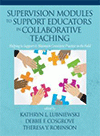
Supervision Modules to Support Educators in Collaborative Teaching
Helping to Support & Maintain Consistent Practice in the Field
Edited by:
Kathryn L. Lubniewski, Monmouth University
Debbie F. Cosgrove, Elmhurst College
Theresa Y. Robinson, Elmhurst College
Published 2019
The classroom teacher in the 21st century is no longer a solo practitioner. What can school leaders use to facilitate on-going, job-embedded, intentionally focused professional development that is unique to the collective needs of teacher pairs and teams as they work together? What can teacher preparation supervisors provide to support teacher candidates and cooperating teachers as they plan, teach, and assess student learning in a co-teaching context?
Supervision Modules to Support Educators in Collaborative Teaching is a research-based supervisory handbook designed to promote on-going teacher reflection and development in collaborative teaching contexts. It is a tool for school leaders and teacher preparation supervisors to use for in-service and pre-service teacher development at all grade levels PK-12.
The handbook’s many resources provide practical guidance for meaningful teacher development that is field-based, relevant to daily teacher work, and artfully presented to build collaboration among teachers as they reflect and learn together. Unique to this approach is that school leaders and supervisors learn alongside teachers and teacher candidates as relevant topics are explored. The handbook contains a collection of eighteen interactive, activity-based modules that focus on topical content knowledge and productive teaching practices. Embedded in the modules are pair and team activities that address problem-solving, dimensions of collaborative teaching, communication and collaboration skill development, understanding of diversity, cultural responsiveness, and shared understanding of evidence-based practices.
This resource is easy to use. Once school leaders and supervisors select a module topic to address the needs of a particular pair or team, they are supported with foundational knowledge of the most current research on the topic, discussion questions about the topic, suggestions of productive practices, questions to deepen personal and group understanding, reflective professional growth activities, critical analysis of teaching scenarios, and monitoring, follow-up, and goal setting strategies. Modules can be used in any order and include reproducible materials for pairs and teams to use as they collaborate and grow professionally.
CONTENTS
Introduction. Acknowledgments. PART I: UNDERSTANDING YOURSELF AND OTHERS. Module 1: Knowing Yourself and Your Colleague, Debbie F. Cosgrove. Module 2: Effective Communication, Kathryn L. Lubniewski and Kirstin Natale. Module 3: Culturally Relevant Pedagogy, Ayanna F. Brown. PART II: DISCOVERING THE CONTEXT. Module 4: Knowledge of Students, Theresa Y. Robinson. Module 5: Partnering With Families, Linda Dauksas. Module 6: Knowing the Community and Utilizing Its Resources, Theresa Y. Robinson. PART III: PUTTING IT ALL TOGETHER. Module 7: Creating a Positive Climate in the Classroom, Wendy A. Harriott. Module 8: Using the Co-Teaching Models, David Hoppey, Keri Haley, and Megan Robinson. Module 9: Promoting Engagement and Positive Behavior, Jaime L. Zurheide. Module 10: Using Individualized Interventions for Challenging Behaviors, Mary B. Haspel. Module 11: Collecting Student Data and Assessment, Kathryn L. Lubniewski. Module 12: Collaborative Planning for Instruction, Debbie F. Cosgrove. Module 13: Differentiating Your Instruction, Lisa Burke. Module 14: Responsible Digital Citizenship, Tracy Mulvaney. Module 15: Using Video to Facilitate Peer Coaching and Problem Solving With Pairs, A. Brooke Blanks. PART IV: ENHANCING PROFESSIONAL PRACTICE. Module 16: Teachers and the Law, Paul R. Klenck, Bernard F. Bragen Jr., and Debbie F. Cosgrove. Module 17: Professional Dispositions, LuEllen Doty and Jeanne White. Module 18: Supporting the Job Hunt, Courtney Miller. About the Contributors.
MORE INFORMATION
Download companion dataset materials for this book
-
Paperback978-1-64113-584-9
Web price: $45.04 (Reg. 52.99)
-
Hardcover978-1-64113-585-6
Web price: $80.74 (Reg. 94.99)
- eBook978-1-64113-586-3

- EDU053000 - EDUCATION: Training & Certification
- EDU050000 - EDUCATION: Collaborative & Team Teaching
- EDU059000 - EDUCATION: Teacher & Student Mentoring
-
 A Practical Guide to Exemplary Professional Development Schools
A Practical Guide to Exemplary Professional Development Schools
-
 Beyond Single Stories
Changing Narratives for a Changing World
Beyond Single Stories
Changing Narratives for a Changing World
-
 Contemporary Perspectives on English as a Medium of Instruction
Contemporary Perspectives on English as a Medium of Instruction
-
 Healing While Studying
Reflections and Strategies for Healing, Coping, and Liberation of Graduate Students of Minoritized Identities
Healing While Studying
Reflections and Strategies for Healing, Coping, and Liberation of Graduate Students of Minoritized Identities
-
 Mentoring for Wellbeing in Schools
Mentoring for Wellbeing in Schools
-
 The AMTE Handbook of Mathematics Teacher Education
Reflection on Past, Present and Future – Paving the Way for the Future of Mathematics Teacher Education, Volume 5
The AMTE Handbook of Mathematics Teacher Education
Reflection on Past, Present and Future – Paving the Way for the Future of Mathematics Teacher Education, Volume 5
-
 The Handbook for Aspiring Higher Education Leaders
The Handbook for Aspiring Higher Education Leaders

